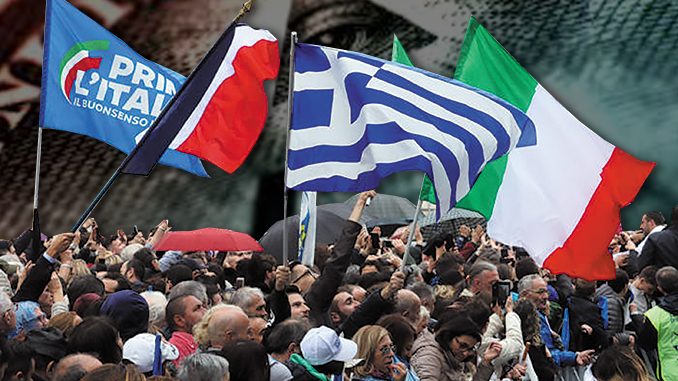
Mass immigration and the failure of globalism are behind Europe’s recent nationalist resurgence.
By John Friend
Nationalists and populists across Europe made tremendous gains in the recent European Union (EU) elections, demonstrating the appeal of these highly demonized political ideologies in an era of economic and political globalization, massive Third World immigration to the continent, and an increasingly out-of-touch elite political class ruling in Brussels determined to push European integration at all costs.
Even traditionally leftwing parties, such as the Social Democrats in Denmark, have taken a more populist approach on issues like immigration. Mette Frederiksen, the 41-year-old leader of Denmark’s Social Democrats whose party recently won 25.9% of the vote in Danish elections, has increasingly pushed her party to the right on the key issue of massive Third World migration into Europe, a top issue for many Danish voters. Frederiksen has addressed the issue in more traditionally leftwing terms, arguing that globalization and massive immigration have harmed the middle and working classes of Denmark and other European nations.
“For me, it is becoming increasingly clear that the price of unregulated globalization, mass immigration, and the free movement of labor is paid for by the lower classes,” Frederiksen stated in a recent biography.
Frederiksen’s Social Democrats have long played a key role in Danish politics, working with more right-leaning parties, including the Danish People’s Party—which is seen by many as the most far-right party in the country—on key issues such as immigration. The Social Democrats in Denmark have supported policies that crack down on refugee resettlement and unchecked migration, positions the traditionally left-leaning party formerly opposed. Frederiksen has argued that SD parties in other European countries must adopt a more hardline stance on immigration, which poses a major threat to their traditional voter base: middle- and working-class Europeans.
“For years, we have underestimated the challenges of mass immigration,” Frederiksen argued at a meeting of Social Democrat parties around Europe late last year. “Economic policy and foreign policy in Europe have been too liberal. We have failed when it comes to maintaining the social contract, which is the very foundation of the social-democratic social model.”
The positions on immigration taken by Frederiksen and other populists across Europe stand in stark contrast to the elites in Brussels, who view massive immigration and spreading “diversity” as moral imperatives that must be championed and implemented across the continent.
Outgoing European Commission President Jean-Claude Juncker, epitomizing the mindset of the nation-wrecking globalist elites that have largely dominated the European Union and broader project of European integration, harshly criticized the various populist and nationalist movements and leaders that have come to the fore of European politics, particularly in recent years as Euroskepticism has risen across the continent.
“These populists, nationalists—stupid nationalists—they are in love with their own country, and they don’t like the others,” Juncker arrogantly and dismissively stated in an interview with CNN shortly before the recent European elections. “In some countries of the European Union, the government, parliament, major parts of society, don’t like those coming from far away. I do like those coming from far away, because the main guiding principle of the European Union should be solidarity. We have to act in solidarity with those who are in worse situations than we are.”
Many Europeans are beginning to view the suicidal mindset of Juncker and other EU elites as entirely contrary to the interests of their respective nation-states, which have seen massive Third World immigration, rising crime and instability, and a total failure on the part of European Union institutions and governments in actually integrating the various newcomers into the EU. Many European nations, such as France, Germany, Sweden, and the United Kingdom, have seen a tremendous influx of so-called refugees, asylum seekers, and other Third World immigrants, resulting in protracted cultural, social, and economic problems across the continent.

The so-called “new Europeans” have largely failed to successfully integrate into European society, preferring instead to cling to their national and ethnic identities, which has contributed to the polarization of society, a fact political leaders like Frederiksen have long recognized.
“In my eyes, it is neither heroic nor humane to bring so many people here that the problems become huge in our own country,” the leader of Denmark’s Social Democrats declared before the 2015 election, “because we’re not very good at integrating in Denmark, and there’s nothing to indicate that we’re going to get better.”
In Italy, the small town of Riace in the southern province of Calabria recently elected a rightwing government after having been dominated by radical leftists for years. The town, long known as a “global village” whose former political leadership openly welcomed migrants, took in hundreds of refugees and other Third World migrants in recent years, sparking a backlash following reported allegations of corruption, fraud, and unrest among the migrant population.
“The problem is that we had too many migrants and we lost the spirit of openness there was initially,” Antonio Trifoli, the newly elected mayor and former town policeman, stated in a recent interview. Trifoli is affiliated with Italian populist Matteo Salvini and his Lega Nord Party, which has seen a dramatic increase in popularity and political clout in recent elections.
“A whole economic system developed with the migrants, but without making the village dynamic again,” Trifoli said. “The model destroyed itself.”
The clash between globalism and populism continues on the European continent, and at this point, it’s safe to say populism is on the rise, largely because of the disastrous effects of globalism.
John Friend is a freelance author based in California.




